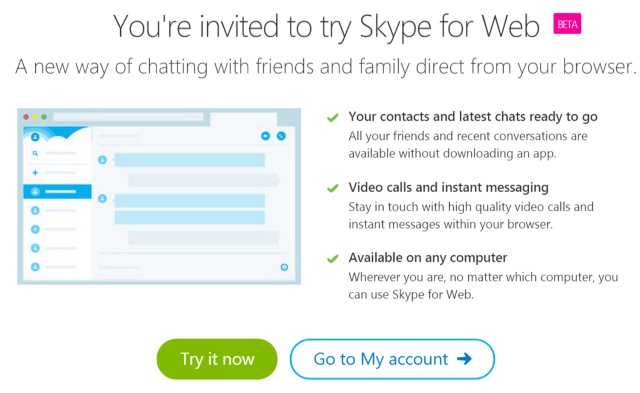
Zoom images online with Power Zoom for Chrome
Power Zoom is a Chrome extension which makes it easier to browse thumbnail images online.
There’s no clicking, no opening images in a new page or tab, no need to click Back afterwards: just hover your mouse cursor over the thumbnail, the linked full-size image is downloaded, and displayed in a pop-up over the current page. Move your mouse away, it disappears, and you can repeat the process elsewhere.

Skype for Web beta brings voice and video chats to your browser without plugins
Installed apps are becoming a thing of the past. Microsoft is just one of a raft of technology companies gradually moving to the cloud and the latest display of this is a new beta version of Skype for Web. The messaging tool has been designed to be used in a web browser without the need for plugins, extensions or other software. At least that is the aim. During the beta stages you'll still have to install a small plugin.
Work being carried out by the Internet Explorer developers should bring plugin-free Real-Time Communications (RTC) to browsers in the near future, and Skype for Web will be able to take advantage of this. The beta is not being made available to everyone straight away, so you'll need to check your account to see if you can try it out.

Run Windows and OS X programs directly from the Chrome web browser
With the increased popularity of the cloud, lines are becoming blurred between what is local and what is stored online. One of my favorite cloud services is Google Drive, as it integrates perfectly with Chrome OS, while also working well with both Windows and OS X.
It can be problematic though, when I am navigating Drive in the browser, and want to open a file. Sure, I can save the file locally, but this is tedious and messy -- my desktop is full of such files. Today, Google blurs the lines even further, allowing both Windows and OS X programs to be launched directly from the Chrome web browser with an extension.
Google modernizes Bookmarks with redesign, enhanced search, sharing, and more
Bookmarks implementations have remained pretty static over the lifetime of the Internet. Google is changing that with 'Bookmark Manager' (formerly called Stars). An extension available in the Chrome Store, it promises to bring your bookmarks into the future with a new design, better search, smart organization, and sharing.
The first thing you will notice is the design, and nice, subtle animations. It feels like Google Drive, with a 'New' button on the left with the navigation under it. Each bookmark is given an image and description in a 'card-like' UI. Bookmarking pages is also a nicer experience. Adding the bookmark to a folder is more intuitive, and you can create a new folder easily. One of my favorite features is that you can include a quick note, reminding yourself why you saved the page.

Google's Trojan Horse reaching completion: Open files in Windows with Chrome Apps
For a significant number of users a computer session starts, and ends with Chrome. Google continued to reinforce this with Chrome Apps, which are apps that run on the desktop, outside of the browser and can be pinned to your taskbar.
You will soon be able to open files from the Windows file explorer directly in Chrome Apps. Chrome apps will be able to specify the file types they handle, and for those file types, you will see the Chrome App listed in 'open with' when you right click a file. If the Chrome App is the only app installed which handles that file type, it will be set to default (so simply double clicking will open the file in the Chrome App). This will essentially remove all distinction of Chrome apps and desktop programs you have installed on Windows.

Google Play Music All Access gets even better with Songza integration
I love me some music, and I love me some Google Play Music All Access. For real though, I use the search-giant's music service for multiple hours every day. Whether it is on my desktop, smartphone or tablet, I consume many songs with the service. Sure, other services like Beats Music and Spotify are good too, but All Access couples its large selection with an unrivaled visual style that makes the entire experience awesome. Heck, starting today, Android app begins using the super-sexy material design.
Unfortunately, with all streaming music services, media discovery can be tricky, as I often find myself listening to the same songs over and over again. While Google's genre-based and curated stations are a good way to discover, even that can be limiting. Today, Google turns it up to 11 and finally integrates features from its Songza acquisition into All Access. The result? Better discovery, plus music that matches a mood or task.

Log into Gmail with a USB drive -- Google adds support for Security Key
Two factor authentication (or two step verification, if you prefer) is very a la mode at the moment. Actually, it has been pushed by companies for some time, but a number of high profile security problems recently has brought it back to public attention again.
Enabling the security feature usually means entering a password as normal, in addition to a passcode sent to a mobile device. Today, Google makes things a little easier for, in its own words, "particularly security-sensitive individuals" by introducing support for Security Key.

Parlez-vous l'internet? Google Translate gains new Chrome extension
The web is truly worldwide, the epitome of globalization and the ever-shrinking world. As much as the McDonaldization of the world means that cultures are on an homogenizing course, there are still plenty of differences to embrace -- language is one of them. Spend just a little time surfing the web and there's a reasonable chance that you'll encounter a foreign language site, or at least a few words and phrases that are beyond your high school French and Latin.
Enter stage right Google Translate. This service of course n'est pas nouveau. In fact Google Translate has been around for ages. Mais maintenant il y a un Chrome extension that makes the translation process easier than ever. Oubliez visiting a dedicated website, now your translation is a mere click away.

Mozilla will make Firefox 34 immune to POODLE, releases fix for older versions
Google yesterday disclosed a major security vulnerability it has found in the SSL 3.0 encryption protocol, that is still employed by many sites across the web, despite long being superseded. Dubbed POODLE (Padding Oracle On Downgraded Legacy Encryption), it allows attackers to steal private data, like cookies, and, possibly, use it to access user accounts on vulnerable sites. The search giant says its Chrome browser should be safe, but warns that others may be vulnerable.
Firefox is one of the vulnerable ones. To address this issue, Mozilla reveals that the upcoming version -- Firefox 34, to be exact -- will feature code which makes it immune to the POODLE attack. For those who use lesser versions of the open-source browser -- most users, basically -- the organization provides an optional fix.
Firefox 33 reveals performance tweaks, search improvements, more robust session restore
Mozilla has released Firefox 33.0 FINAL for desktop, with Firefox for Android 33.0 due to follow in the coming days.
Like the previous release, the desktop build of Firefox 33 boasts no major new features, but its Android counterpart gains vastly improved tab management tools as well as the ability to send videos to both Chromecast and Roku devices.

Pale Moon 25.0 released, moves further away from Firefox, drops Windows XP support
Moonchild Productions has released a major update to its Firefox browser variant for Windows with the release of Pale Moon 25.0 and Pale Moon x64 25.0, which sees the browser drop support for Windows XP.
Version 25.0 sees the version number jump for the first time since the browser forked away from its Firefox parent due to major changes in the way the browser identifies itself.

Find a bug in Chrome? You could earn $15,000 and entry into the Google Hall of Fame!
There are award shows for everything nowadays, celebrating actors, athletes and more. However, computer nerds do not get the credit they deserve; we should get an award show too, right? Hell, they should give out trophies for fixing family members' computers. I have spent hours at my Uncle Roy's smelly house removing malware, only to leave with not so much as a thank you.
Don't worry though, Google cares about your nerdy endeavors -- if it helps the Chrome browser, that is. You see, the search giant is increasing the maximum bounty for finding bugs in the browser to $15,000. While money is awesome, the recognition may be equally cool, as your name may be added to the Google Hall of Fame!

You can now mute audio in Chrome with a single click
Have you encountered situations before where audio suddenly starts to play in your web browser of choice without you clicking on a play button? This can be extremely frustrating, especially if you have opened multiple sites in rapid succession.
It happens because websites start to autoplay audio, either in the form of an embedded video or audio file, when a site gets loaded in the browser -- even if it is not the active tab.

Get Google Chrome working again with this tool
Your browser's misbehaving? It's a common problem, and you've probably got your own quick fixes: delete the cache, scan for malware, remove the last add-in you installed, whatever it might be.
Now Google is offering a little extra assistance with Chrome Software Removal Tool (CSRT), a Windows beta which scans for programs known to cause problems with Google Chrome and offers to remove them.

Opera Beta 25 arrives, finally adds full bookmark support, debuts Linux build
Opera has released Opera Beta 25, which sees the Opera Next channel renamed as part of what could be a landmark release for the alternative web browser when it hits final release next month. The headline new feature is the overdue implementation of bookmarks into the browser.
It’s also joined by the first Linux beta build since Opera relaunched last year, plus offers a redesigned Start page, integrated PDF viewer and support for web notifications direct from the Windows or Mac desktop.
